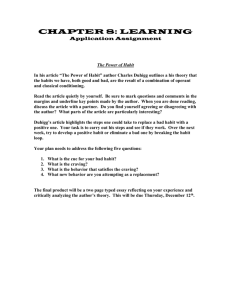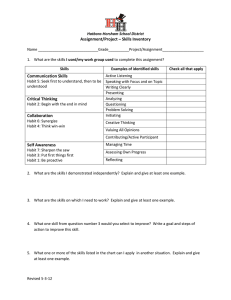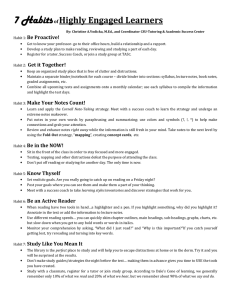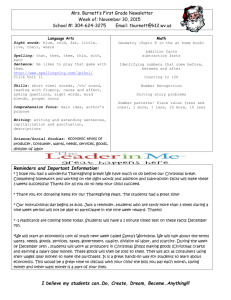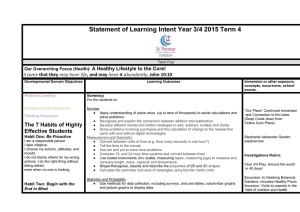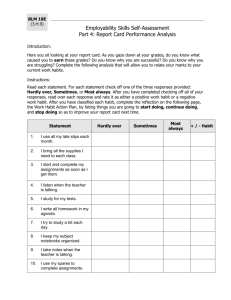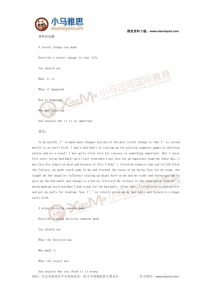Leadership challenges-Karen
advertisement
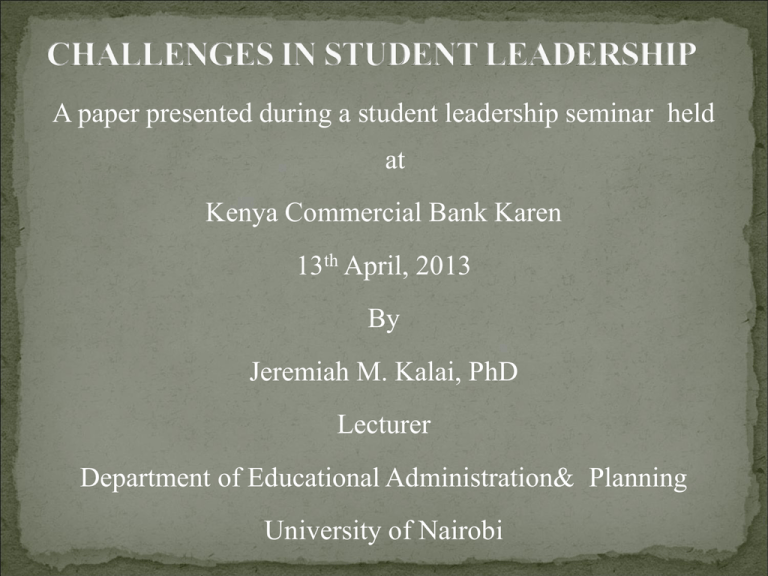
A paper presented during a student leadership seminar held at Kenya Commercial Bank Karen 13th April, 2013 By Jeremiah M. Kalai, PhD Lecturer Department of Educational Administration& Planning University of Nairobi Koontz and O’Donnell (2007), define leadership as the ability of the manager to induce subordinate to work with confidence and zeal.” On the other hand, Kouzes and Posner (2007) note that leadership is the ultimately about creating ways for people to contribute to making the extraordinary happen. Leadership is not always about the extra-ordinary, but many times it simply requires providing of direction. This assumption stems from the trait theory that assumes that the world has leaders and followers Okumbe (1998) cites Katz and Kahn (1978) who defined leadership as the influential increment over and above mechanical compliance with routine directives of the organization. The foregoing definition sees leadership as process where a person influences others to do something of their own volition, neither because it is required nor because of the fear of consequences for non-compliance. D’Souza (1999) cites Shakespeare who noted that some people are born great, others achieve greatness and others have greatness thrust upon them. According to literature reviewed by Stogdill (1974), leaders tend to have higher capacity to do things such as being more intelligent, more persuasive, more of problem solvers and possessing a level of charm and charisma than the average people. While scholars are now in agreement that traits are not the only determinant of leadership, it is common knowledge that leadership is not simply about traits. Leadership Begins with Self‐Leadership Begin with who am I? What are my values and Core beliefs? What kind of Leader do I want to be? What motivates me? What do I value? Habit 1: Be Proactive “Take Responsibility for your life” Habit 2: Begin with The End in Mind “Define your mission and your goals in life.” Habit 3: Put First Things First “Prioritize, and do the most important things first.” Habit 4: Think Win-Win- “Have an everyone-can-win attitude.” Habit 5: Seek first to understand, then to be understood “Listen to people sincerely.” Habit 6: Synergize- “Work together to achieve more.” Habit 7: Sharpen The Saw-“Renew yourself regularly.” (Stephen Covey, 1999) 1: Attitude Development-Effective Student Leaders display positive and enthusiastic attitudes at all times. 2: Communication Skills- Effective Student Leaders must take the responsibility of a communicator seriously. 3: Positive Role Modelling-Effective Student Leaders must set a proper example at all times. 4: Personal Responsibility-Effective Student Leaders will take on whatever responsibility needed to accomplish “what needs to done when it needs to be done.” 5: Understanding Self-Motivation-Effective Student Leaders take initiative. 6: Sensitivity in Working with Peers-Effective Student leaders understand that they must “motivate and NOT dictate.” 7: Self-Accountability-Effective Student Leaders understand that a primary quality to a successful leader is the ability for self-accountability. 8: Action Plans to Achieve Group Goals-Effective Student Leaders are aware of the group goals and then take action plans to implement the necessary steps to ensure that the students in their section are properly prepared. 9: Understanding Leadership-Effective Student Leaders will do what is right when no one is watching and stay true the organization’s core values. 10: TEAMWORK- Effective student leaders understand that only Together Everyone Achieves More 11: Attributes of Leadership Effective Student Leaders portray the following attributes: 12: Commitment to excellence-Effective Student Leaders are individuals who have a clear commitment to excellence. 13: INTEGRITY- Effective Student Leaders conduct their lives with integrity. The dictionary defines integrity as “the soundness of moral character, adherence to ethical principles, and being unimpaired.” 14: WORK ETHIC- Effective Student Leaders are the epitome of hard workers. Hard work is the basic building block of every kind of achievement. Student –leaders’ questions “If not now, when?, If not here, where?, If not you, who?”- An intricate building block in the infrastructure of your organization will be your development of an effective Student Leadership Council. Leaders employ different leadership styles based on circumstances and the type of group led. Where people demonstrate immaturity, leaders tend to be more autocratic. On the contrary, where the followers are mature and capable of being self-driven, leaders are likely to withdraw and allow the group exercise autonomy (Laissez faire leadership). In situations where individuals value rewards, leaders tend to employ transactional leadership. In communities that are sensitive of being involved, employers may choose to be democratic. In other situations, the leader may choose to employ a style that creates a fit between the organization and individuals led. Being a focal point of student anger, fear and mistrust as they go through different issues that affect them at University campuses. This means that student leaders are likely to be on the receiving end from the other students especially when undergoing a change process. Fear of violence or other acting out behavior Implementing changes which were decided from above; that you may not agree with Emotional stress and guilt related to making decisions that have powerful consequences on students’ lives Most leadership challenges begin with self and they revolve around: i) Personal perception of leadership ability-those who think they can’t might find themselves unable, not due to lack of capacity but due to perception challenges Ii) Low self-esteem-this can make brilliant leaders to fail due to how they look at themselves Iii) Lack of prior preparation for leadership Iv) lack of modelling and nurturing structures V) Lack of peer administrative support Vi) inability to network vii) Poor time management: Students leaders are first and foremost supposed to be students. However, leadership demands may tend to crowd out all other demands. This is further aggravated by having to work for long hours. viii) Unrealistic expectations: Student leaders also have to contend with unrealistic expectations from fellow students and other members of the college community. While College administration may be very clear about what student-leaders need to do, students may perceive student leaders as saviours who should assist on all matters ranging from missing services to solving issues of social nature Being misunderstood, misinterpreted, not listened to. Need to communicate more carefully and repeatedly. Students are part of the system that makes the campus community. At times, student leaders may choose to pursue issues that are populist in nature without clarifying from administrators what the official position Students sometimes may not be able to meet their day financial obligations which may handicap their operations. Lead as I would like to be led. Exemplify a passion for excellence. Accountability, commitment, and integrity. Dare to be all I can be. “People forget how fast you did a job-but they remember how well you did it. The price of greatness is responsibility. We are continually faced by great opportunities brilliantly disguised as insoluble problems. Every job is a selfportrait of the person who did it. Autograph your work with excellence. Leadership is not something you do to people. It’s something you do with people.”- -Ken Blanchard “ “The difference between impossible and possible lies in a man’s determination.” You can make a difference and everything you do matters!”

